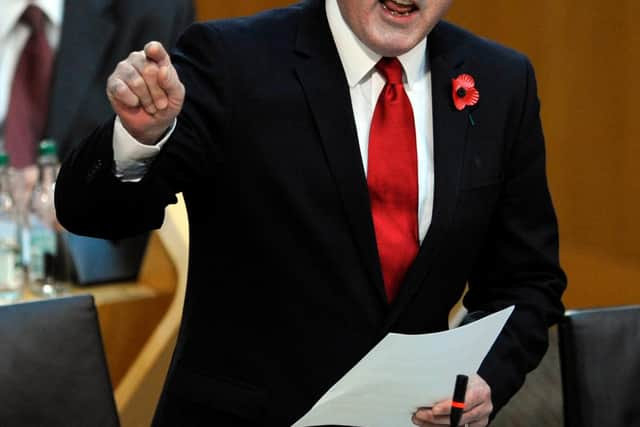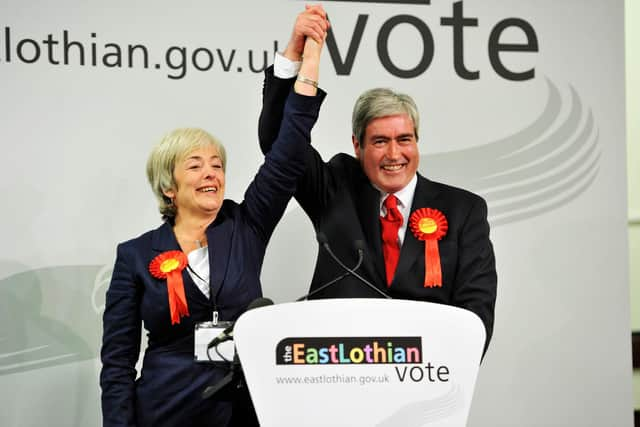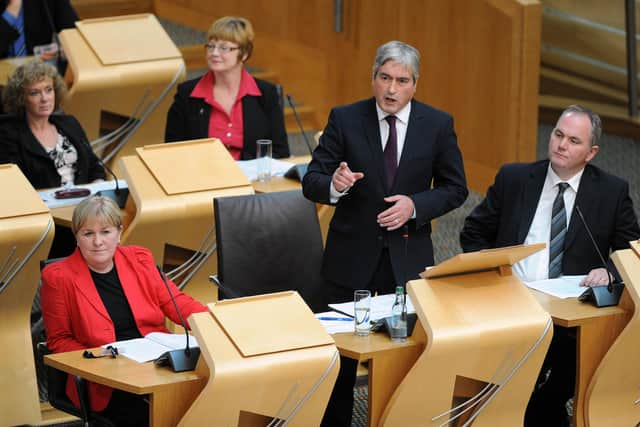Election 2021: Former Scottish Labour Iain Gray looks back on his time as an MSP as he bids Holyrood farewell
and live on Freeview channel 276
After being one of the first members of the new Scottish Parliament in 1999, Labour s Iain Gray is now stepping down and looking forward to retirement.
"It's always going to be very special for those of us who were lucky enough to be elected right at the start," he says. "It's almost hard to remember now just how exciting and optimistic it was – a new parliament and new possibilities. It was a real privilege to be part of that and nobody can ever take that away from the 129 of us who were there."
Advertisement
Hide AdAdvertisement
Hide AdElected as MSP for Edinburgh Pentlands, he was appointed straight away as a junior minister in the Labour-Lib Dem coalition led by Donald Dewar.


"It was a bit of a baptism of fire," he recalls. "It wasn't something I'd been expecting but it was a privilege and allowed me to take part in a lot of things that I look back on with a great deal of pride."
He helped put through the very first piece of legislation the parliament passed, an emergency change in the law to close a loophole which had allowed a killer to walk free from the State Hospital at Carstairs.
And he was also involved in the first planned piece of legislation, the Adults with Incapacity Act.
Advertisement
Hide AdAdvertisement
Hide AdMr Gray had four ministerial roles in that first parliament – junior health minister, junior justice minister, social justice minister – which was largely housing – then education and lifelong learning minister.


The first two jobs both involved trying to address the drugs problem.
"Whatever we did didn't resolve that issue because we see Scotland shamefully with the worst levels of drug deaths anywhere in Europe.
"One of the things we introduced was specialist drug courts so instead of those suffering from addiction who ended up in the justice system being sent to prison they agreed to a programme to address their addiction problems and specialist sheriffs would bring them back on a regular basis; they would undertake drug testing and that programme would be overseen. I think that was quite a successful initiative and I would like to have seen it rolled out further but the SNP closed those drug courts down and I think that was a mistake.
Advertisement
Hide AdAdvertisement
Hide Ad"This is a problem which I guess no-one has a magic answer to, but we did try hard in those days and maybe we have taken our attention off it in recent years and we're paying the price for that now."


Just four years after being elected, he lost his seat at the next election. "I didn't see it coming and it was very tough at the time, but that's how politics works."
And it opened other doors – he worked as special adviser to Alistair Darling who was combining his Transport Secretary role with being Scottish Secretary.
"I think that gave me an almost unique, at that time, understanding of how devolution was working and developing from both ends - I had been a minister in the Scottish Executive, as it was then, and then I was working with Alistair in Whitehall with the UK government, the UK civil service on issues and relationships with the Scottish Executive."
Advertisement
Hide AdAdvertisement
Hide AdMr Gray returned to Holyrood as MSP for East Lothian in 2007 with Labour now in opposition and the following year he became leader after Wendy Alexander quit.
He took the party into the 2011 election with high hopes but it ended with an SNP landslide and Alex Salmond winning an overall majority. Mr Gray resigned later that year.
"To have the opportunity to be leader of your party is an enormous honour – I know it's an honour that's been shared amongst probably more Labour MSPs than we would have liked in recent years, but that doesn't take away from the fact it is a big honour and a big challenge.
"Obviously I'm disappointed at how it turned out but I'll always be glad I got that chance."
Advertisement
Hide AdAdvertisement
Hide AdHe later served as finance spokesman but particularly enjoyed being education spokesman, a return to where his professional life began as a maths and physics teacher at Edinburgh's Gracemount High School.
Looking back, he says the parliament he is leaving is not the one he was elected to in 1999.
“It’s much more powerful, a far better balanced parliament. When we started it was almost entirely about spending money – pretty well all its resources came from the block grant from Westminster and parliament could decide how it was spent.
"Thanks to the Calman commission, and then particularly the Smith commission in 2014, of which I was a member, the parliament now has quite extensive tax-raising and welfare powers which it didn’t have at the start, so I think the parliament has grown and matured through that time.
Advertisement
Hide AdAdvertisement
Hide Ad“Unfortunately it hasn’t matured in the sense of the atmosphere of the parliament and how it operates.
“It was always party political, but in those early days there was sense of trying to work together to make Scotland better and we had an opportunity to do that which hadn’t existed prior to 1999. I think that has been lost and even more so since we went through the independence referendum. The country itself and the parliament became much more divided than it had been before and that has never healed.
“In the run-up to the 2011 election I said if SNP was elected the next five years would be completely dominated by their pursuit of independence. I was rubbished for that at the time – Alex Salmond was saying the election wasn’t really about independence – but the only mistake I made was saying it would be the next five years; it has been the next ten years.”
Nevertheless he says he is more optimistic about Labour’s prospects now than he has been for some time.
Advertisement
Hide AdAdvertisement
Hide Ad“We had a pretty dominant position in the parliament at the start and it’s no great confession to say we were probably complacent about that.
“Labour delivered devolution but having done that we struggled a bit to find our own political narrative in that new circumstance and as a result that dominance ebbed away and was lost.
“Since the referendum we have found it difficult to find a place to have our voice which is opposed to independence on principle but supportive of devolution. That has been a bit squeezed between the two extremes of the constitutional argument.
“It's early days yet but Anas [Sarwar] has been successful in beginning to find our voice again between the two extremes and I think that is articulating where a lot of the people of Scotland are. If we can do that I think we can begin to create a much stronger position again in Holyrood.”
A message from the Editor:
Thank you for reading this article. We're more reliant on your support than ever as the shift in consumer habits brought about by coronavirus impacts our advertisers.
If you haven't already, please consider supporting our trusted, fact-checked journalism by taking out a digital subscription.
Comment Guidelines
National World encourages reader discussion on our stories. User feedback, insights and back-and-forth exchanges add a rich layer of context to reporting. Please review our Community Guidelines before commenting.